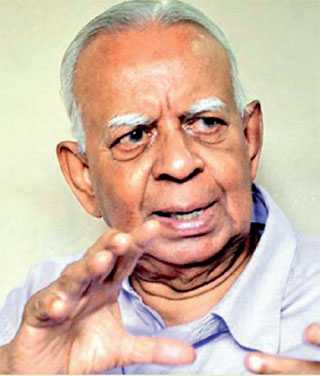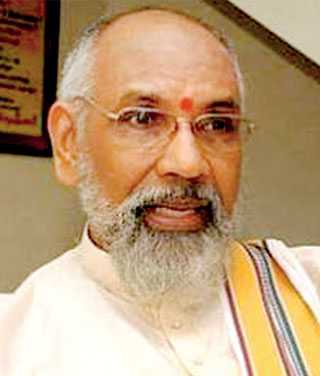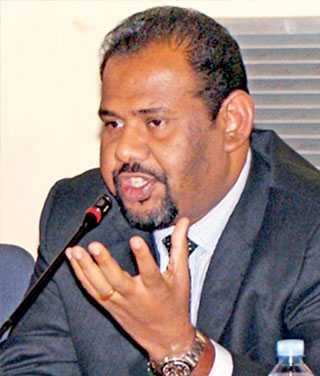Friday Feb 20, 2026
Friday Feb 20, 2026
Wednesday, 27 January 2021 00:20 - - {{hitsCtrl.values.hits}}

TNA Leader R. Sampanthan

TMTK Leader C.V. Wigneswaran

TNPF Leader G. Ponnambalam
 “Only God can save the Tamil people now” (Thamil Makkalai Inik Kadavul Thaan Kaappaatra Vaendum) was the anguished response of respected Sri Lankan Tamil political leader Samuel James Veluppilaai Chelvanayakam after the results of the 1970 Parliamentary Elections were known.
“Only God can save the Tamil people now” (Thamil Makkalai Inik Kadavul Thaan Kaappaatra Vaendum) was the anguished response of respected Sri Lankan Tamil political leader Samuel James Veluppilaai Chelvanayakam after the results of the 1970 Parliamentary Elections were known.
The United Front (UF) led by Sirimavo Bandaranaike had swept the polls with a two-thirds majority. The UF constituents – Sri Lanka Freedom Party (SLFP), Lanka Sama Samaja Party (LSSP) and Communist Party (CP) had obtained 91, 19 and six seats respectively in a Parliament of 157 MPs. The chief opposition United National Party (UNP) had been reduced to 17. The Ilankai Thamil Arasuk Katchiknown in English as the Federal Party led by S.J.V. Chelvanayakam got 13 seats.
Chelvanayakam’s “resort to divine providence” was due to the sense of utter helplessness felt by the chief Tamil political party of north-eastern Tamils after the elections. The past years had seen the ITAK/FP engage in a political strategy of “agitate cum negotiate” to win back the lost rights of the Tamil people. In a situation where the two major Sinhala-dominated parties were more or less evenly matched, the Tamil party usually had the third largest number of seats in Parliament. Thus the ITAK would hold the balance of power with its bloc of MPs and utilise that clout to negotiate with the UNP and SLFP.
This approach even helped the ITAK to make and unmake governments. In March 1960 the UNP could not retain power because the FP did not support it. In March 1965 the UNP could form a government chiefly due to ITAK support. An important part of the ITAK/FP election campaign had been a request to the Tamil people to elect the party with a bloc of MPs in order to utilise it as leverage in negotiating with Governments lacking a viable majority.
The 1970 elections changed this situation totally. The UF Government with 116 seats had a two-thirds majority and there was no need for it to negotiate with the FP. Moreover the two-thirds majority provided the new Government unbridled power to disregard Tamil opinion and ride rough shod over them. The
presence of left parties in the Government also did not inspire confidence as they had begun adopting the ‘majoritarian’ line of the SLFP, a noteworthy manifestation of which was the chanting of slogans such as “Dudleyge Bade Masala Vadey” at May Day processions. The ITAK/FP was therefore extremely frustrated over this turn of events and Chelvanayakam’s desperate cry was an index of the melancholy mood of the Tamil people at that time and resonated well with them.
This frustrated feeling of helplessness felt by the Tamil people in 1970 paved the way for greater solidarity and radicalisation in that decade.
Firstly there was political unity. The main Tamil parties Ilankai Thamil Arasuk Katchi and All Ceylon Tamil Congress (ACTC) closed ranks and formed the Tamil United Front in 1972 and later the Tamil United Liberation Front (TULF) in 1976. The Tamil political demand escalated to that of secession.
The TULF contested the 1977 elections on the “Tamil Eelam” platform and won overwhelmingly. The mode of Tamil political struggle transformed from Gandhian non-violence to armed militancy. The Liberation Tigers of Tamil Eelam (LTTE) was formed in May 1976. Arguably, the initial mood of helplessness paved the way subsequently for political unity, and escalation of political demands.
Much water has passed under the bridge since then. The ethnic conflict escalated and exploded into total war. Sri Lanka in general and the Tamil people in particular have undergone tremendous, terrible experiences. Many things have changed and life has transformed.
The consequences of the conflict have far exceeded the original causes. The country is yet grappling with the consequences let alone address the causes. The Tamil national question is still unanswered.
Tamils, President Rajapaksa and his Government
Currently the advent of President Gotabaya Rajapaksa and his Government has amounted to a watershed moment. To many Tamils who retain memories of the turbulent times of the ’70s of the 20th century, the present situation may evoke a sense of déjà vu.
As was the case 50 years ago, the Tamils once again feel utterly helpless under the Gotabaya Rajapaksa dispensation. Gota conducted an electoral campaign targeting the majority community alone and romped home the winner. The minority communities voted almost en masse for his rival. After assuming office President Rajapaksa has demonstrated clearly that the Government would cater primarily to the perceived needs of the majority community.
The positive progress that had been achieved so far on the ethnic front is being dismantled. There are many acts of omission and commission affecting Tamils from the prohibition of the National Anthem being sung in Tamil at Independence Day celebrations to the seizure of Tamil lands and places of worship under the façade of Archaeological preservation. The sword of Damocles hangs over devolution and the Provincial Councils. In the prevailing situation, Tamils feel utterly helpless politically.
A similar mood of despondency and feeling of helplessness led to a closing of ranks and escalation of demands by Tamil political parties five decades ago. It appears now that history is repeating itself albeit with slight variations. There is political solidarity and escalation of political demands. A significant indicator of this “change” occurred on 15 January this year when three Tamil political parties unitedly sent a joint letter to the 47 member states of the United Nations Human Rights Council. The contents of the missive was a radical departure from the earlier position adopted towards the UN role vis-à-vis Sri Lanka.
2020 Parliamentary Elections and Tamil votes
The 2020 Parliamentary Elections saw the votes of Sri Lankan Tamils in the Northern and Eastern Provinces being split between what are regarded as Tamil nationalist parties on the one hand and parties affiliated with the Government on the other.
Government or pro-Government parties obtained five seats in both provinces. The Eelam People’s Democratic Party (EPDP) won two seats in the north (Jaffna and Wanni) while the Sri Lanka Freedom Party (SLFP) won one (Jaffna). In the east Tamil candidates from both the Sri Lanka Podujana Peramuna (SLPP) and Thamil Makkal Viduthalaip Puligal (TMVP) won one seat each in the Batticaloa District.
Three Tamil Nationalist parties obtained 13 seats. Two of these were appointed on the National List. The premier political configuration of the Sri Lankan Tamils namely the Tamil National Alliance (TNA) contested under the House symbol of the Ilankai Thamil Arasuk Katchi (ITAK). The TNA altogether polled 327,682 (2.82%) votes and got 10 seats including one appointed MP. The Tamil National People’s Front (TNPF) contesting under the Ahila Ilangai Tamil Congress (AITC) symbol of cycle, polled 67,766 (0.58%) and got two MPs, one elected and another appointed. The Thamizh Makkal Thesiya Koottani (TMTK) obtained 51,301 (0.44%) votes and got one elected MP.
These three Tamil nationalist parties were bitter rivals at the 2020 elections. There is very little love lost among party leaders and stalwarts. Their bickering continued before, during and after the 2020 elections. There are many bones of contention among these parties.
A very important area of disagreement or acute rivalry has been the approach to be adopted towards resolutions passed by the United Nations Human Rights Council (UNHRC) regarding Sri Lanka and the strategy to be pursued by Sri Lankan Tamils in relation to the UN. However the three Tamil parties surprised the world – and possibly their supporters – by unitedly sending a joint letter addressed to all 47 member states of the UN Human Rights Council on 15 January.
The current membership (2021) of the UNHRC is as follows. Argentina, Armenia, Austria, Bahamas, Bahrain, Bangladesh, (Plurinational State of) Bolivia, Brazil. Bulgaria, Burkina Faso, Cameroon, China, Côte d’Ivoire, Cuba, Czechia, Denmark, Eritrea, Fiji, France, Gabon, Germany, India, Indonesia, Italy, Japan, Libya, Malawi, Marshall Islands, Mauritania, Mexico, Namibia, Nepal, Netherlands, Pakistan, Philippines, Poland, Republic of Korea, Russian Federation, Senegal, Somalia, Sudan, Togo, Ukraine, United Kingdom of Great Britain and Northern Ireland, Uruguay, Uzbekistan and (Bolivarian Republic of) Venezuela.
Joint letter to all member states of UNHRC
The top three signatories of the joint letter calling for decisive action by the UN were TNA Leader Rajavarothayam Sampanthan, TNPF Leader Gajendrakumar Ponnambalam and TMTK Leader C.V. Wigneswaran. In addition there were eight other signatories comprising community and religious leaders. In view of its importance the contents of the letter and names of signatories are reproduced here.
15 January 2021
Heads of Missions
Missions of the 47 Member States represented in the UN Human Rights Council
Your Excellencies,
Call for decisive action at the 46th Session of the UNHRC
We, the elected representatives of the Tamil people in Sri Lanka, leaders of Tamil national political parties, members of the Tamil victim communities and Tamil civil society organisations write this letter in the lead up to the 46th Session of the United Nations Human Rights Council (UNHRC) when the situation in Sri Lanka is to be evaluated.
We note that within a week of the end of the armed ethnic conflict in Sri Lanka, a joint communiqué by the Government of Sri Lanka and the United Nations was issued at the conclusion of UN Secretary-
General’s visit to Sri Lanka on 23 May 2009 with the following:
“Sri Lanka reiterated its strongest commitment to the promotion and protection of human rights, in keeping with international human rights standards and Sri Lanka’s international obligations. The Secretary-General underlined the importance of an accountability process for addressing violations of international humanitarian and human rights law. The Government will take measures to address those grievances.”
Upon Sri Lanka failing to take meaningful steps to address the above commitments, the UN Secretary General appointed on 22 June 2010, a three-member panel to look into human rights and accountability issues during the final stages of the armed ethnic conflict in Sri Lanka. This report of the Panel of Experts (POE) was handed over to the Secretary General in March 2011. Subsequently, the Secretary General referred the POE to the President of the UNHRC and the High Commissioner for Human Rights in September 2011.
Thereafter, the UNHRC adopted Resolution 19/2 “Promoting Reconciliation and Accountability in Sri Lanka” in March 2012 and since then has been seized of the matter with several resolutions in March 2013 and March 2014. Subsequently, the Government of Sri Lanka co-sponsored Resolutions 30/1 (October 2015), 34/1 (March 2017) and 40/1 (March 2019).
Leaders across the political spectrum in Sri Lanka including from both the major political parties have categorically and without exception stated that they will protect the Sri Lankan armed forces from prosecutions. It is now time for Member States to acknowledge that there is no scope for a domestic process that can genuinely deal with accountability in Sri Lanka.
The continuing and intensifying oppression against the Tamils including militarisation, indefinite detention of political prisoners, land grab in the name of archaeological explorations, the denial of traditional, collective land rights like cattle grazing rights, intensifying surveillance of political and civil society activists, the denial of burial rights during COVID19 to our Muslim brethren and the denial of the right to memory underscore the urgency of addressing the deteriorating situation.
As the UNHRC meets in February and March 2021 to evaluate the Sri Lankan Government’s commitments under Resolution 40/1 and plan further action, we urge that member states categorically come to this conclusion by way of a final Resolution. The Resolution must declare that Sri Lanka has failed in its obligations to investigate allegations of violations committed during the armed ethnic conflict and atrocity crimes including genocide, crimes against humanity and war crimes. In such a context the Resolution must acknowledge that there is no prospect for accountability in Sri Lanka by way of its own domestic mechanisms or through hybrid mechanisms.
We request the following:
Member States urge in the new resolution that other organs of the United Nations including the UN Security Council and the UN General Assembly take up the matter and take suitable action by reference to the International Criminal Court and any other appropriate and effective international accountability mechanisms to inquire into the crime of genocide, war crimes and crimes against humanity.
The President of the UNHRC refers matters on accountability in Sri Lanka back to the UN Secretary General for action as stated above.
Member States to mandate the Office of the High Commissioner for Human Rights (OHCHR) to continue to monitor Sri Lanka for ongoing violations and have an OHCHR field presence in country.
Without detracting from that which has been stated in point 1 above, take steps to establish an evidence gathering mechanism similar to the International Independent Investigatory Mechanism (IIIM) in relation to Syria established as a subsidiary body of the UN General Assembly with a strict time frame of twelve months duration.
We reiterate the need for concrete action with accountability and for the above the matter to be escalated to higher forums.
Thus, we urge Member States to take decisive and timely action to grant redress to the people who have been denied justice thus far.
Signatories
Hon. R. Sampanthan, Member of Parliament, Leader – Tamil National Alliance
Hon. G.G. Ponnambalam, Member of Parliament, Leader – Tamil National People’s Front
Hon. Justice C.V. Wigneswaran, Member of Parliament, Leader – Tamil Makkal Tesiya Kootani
Rev. Fr. Leo Amstrong, Tamil Heritage Forum, Mullaitivu
Mr. Sabharathinam Sivayohanathan, Eastern Province Civil Society Forum
Mr. Rasalingham Vikneswaran, President – Amparai Civil Society forum
Mr. Amarasingham Gajenthiran, General Secretary – Tamil Civil Society Forum (TCSF)
Ms. Yogarasa Kanagaranjini, President – Association for Relatives of the Enforced Disappearances, North and East
Mr. Subramanium Sivaharan, President – Tamil Thesiya Vaalvurimai Iyakkam (TTVI)
Velan Swamikal, Sivaguru Aatheenam
Rt. Rev. Dr. C. Noel Emmanuel, Bishop of Trincomalee
The above letter demonstrates clearly that Tamil political parties and civil society organisations are closing ranks and forging greater intra-ethnic unity. It also indicates that Tamil political demands are intensifying. There is a tactical shift in the approach towards the UN. The Tamil parties want the accountability issue taken out of the UNHRC and handed back to the UN Secretary-General for action. The UN Human Rights Commissioner however is requested to continue monitoring Sri Lanka regarding human rights violations.
The letter refers to allegations of genocide in addition to crimes against humanity and war crimes. It also speaks of a referral to the International Criminal Court thereby involving the UN General Council and Security Council. The letter also seeks to establish an evidence gathering mechanism similar to the International Independent Investigatory Mechanism (IIIM) in relation to Syria.
The very act of a letter being formulated with such explosive requests – regardless of success or failure – was quite shocking to political observers. ‘Had the Tamil parties gone too far?’ was the question. What do they hope to achieve by this and what really is achievable were related queries.
Michele Bachelet’s report a bolt out of the blue
Even as the pros and cons of these issues were being evaluated came a bolt out of the blue in the form of UN Human Rights Commissioner Michele Bachelet’s report. The UN Human Rights Chief had prepared a 17-page report ahead of the 46th session of the UNHRC from 22 February to 19 March. Copies were sent to the Sri Lankan Government which was expected to make its response known on or after 27 January 2021.
However substantial parts of the UN HR High Commissioner’s report were published by some Sri Lankan newspapers. These news reports revealed that the UN Human Rights Commissioner had come down hard on the Sri Lankan Government and was encouraging member states of the UNHRC to consider punitive measures such as invocation of universal jurisdiction, referral to the International Criminal Court and sanctions against targeted individuals like asset freezes and travel bans. Here are relevant excerpts:
“In view of recent trends, the High Commissioner calls on the Human Rights Council to enhance its monitoring of the human rights situation in Sri Lanka, including progress in the Government’s new initiatives, and to set out a coherent and effective plan to advance accountability options at the international level.
“Member states have a number of options to advance criminal accountability and provide measures of redress for victims. In addition to taking steps towards the referral of the situation in Sri Lanka to the International Criminal Court, Member States can actively pursue investigation and prosecution of international crimes committed by all parties in Sri Lanka before their own national courts, including under the principles of extraterritorial or universal jurisdiction. The High Commissioner encourages Member States to work with OHCHR, victims and their representatives to promote such avenues for accountability, including through opening investigations into possible international crimes, and to support a dedicated capacity to advance these efforts.
“Member States can also apply targeted sanctions, such as asset freezes and travel ban against State officials and other actors credibly alleged to have committed or be responsible for grave human rights violations or abuses, as well as support initiatives that provide practical benefits to victims and their families.”
Media disclosures of the report showed that the UN Human Rights Commissioner as well as the Sri Lankan Tamil nationalist parties were on the same page as far as seeking recourse to the International Criminal Court was concerned. This naturally gives rise to interesting conjectures. How did the squabbling Sri Lankan Tamil parties forge unity and adopt a common position towards the Sri Lankan Government at the UN in Geneva? Why did the UN Human Rights Commissioner Michele Bachelet take up such a tough stand on Sri Lanka? These and other related matters will be discussed in detail in the forthcoming second part of this article.
(D.B.S. Jeyaraj can be reached at [email protected])